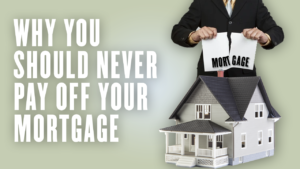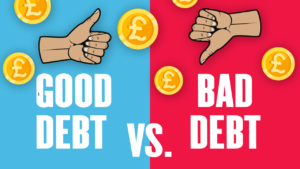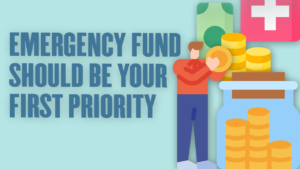For most homeowners, paying off your mortgage and owning your home outright is a major financial objective. Being mortgage-free has many benefits. One is getting rid of a big financial burden.
Another is saving thousands of pounds in interest payments. From a young age I was told to save money and get rid of debt to give me peach of mind.
A mortgage is the largest debt you will ever have, so its always been the dream of most people to pay off their mortgage as early as possible. In this article I will share the pros and cons of paying off your mortgage in full.
Paying off your mortgage ahead of schedule can be beneficial. However, it may not be the best option for your circumstances and objectives especially if you want to be an investor. Depending on your financial situation, you may be better off sticking to your original mortgage plan. You can then use any extra funds to achieve your investment goals.
Outlined below are the main reasons why early mortgage repayment might not be the best option for you.
Why You Should Never Pay Off Your Mortgage
Firstly a mortgage is the cheapest money you will every borrow, even with rising interest rates mortgage debt is still very cheap compared to loans. Mortgages can be as low as 4% in todays market, so if you can find an investment like an property that can make you more than 4% you need to look at investing in that.
If you have investment opportunities that offer higher rates of return than your mortgage interest payment. In that case, it would be advantageous to keep your mortgage and invest your available funds in that opportunity rather an overpaying your mortgage. An example is the stock market from 1992 to 2021 the stock markets average annual return over a 30 year period has been 10.66% and 8.10% when adjusted for inflation.
So during that period you would have earned more money investing in the stock market rather than overpaying your mortgage.
House prices in the UK have averaged 4.3% per year since 2011, but if you factored in average rental profits of 10% you could have returned 14% per year in buy to let.
Most people automatically associate debt with being bad and urge you to pay it off as soon as possible. I agree that the idea of being debt-free initially makes perfect sense in many situations. I’ve discovered that not all debts are created equal.
When it comes to property investing, debt can be a powerful tool that can increase your returns.
By borrowing money to purchase an investment property, you’re able to leverage equity in your property to generate additional wealth.
This is known as ‘equity investing’ and it can be a great way to build wealth over time. Equity investing carries risks. However, if done correctly, it can be a powerful tool to create wealth in the long-term.
Credit card debt, payday loans, car finance and personal loans are examples of what we call “BAD Debt”.
They frequently come with high-interest rates and other fees, so even with paying each month the balance hardly reduces.
Good debt helps you build a solid credit history and benefits you both now and in the future.
Good Debt VS Bad Debt
Most people believe ALL DEBT IS BAD, but that is not actually true. Good Debt and Bad Debt are terms used by multiple experts.
Good Debt is used to describe debt that helps with your financial situation. Its associated with borrowing money to invest in income producing assets (For example a mortgage). Good debt often carries much lower interest rates and will help grow your net worth over time.
Bad Debt is debt with high interest rates. It is used to buy items that decrease in value, like cars, laptops, and holidays. This type of debt is obtained through loans and credit cards.
Why an Emergency Fund Should be Your First Priority
Before you pay off your mortgage, its vital you build an emergency fund. You never know when you might have a financial emergency. These could include unexpected expenses, such as a sudden loss in income, your car breaks or you lose your job.
It is never simple to pay for emergency expenses during difficult times. In these situations, it can be quite challenging to obtain a loan to help you out.
Create an emergency fund with enough cash to cover your living expenses for six months.
Only after that should you think about overpaying your mortgage.
This will get you through tough times without the need to get high interest rate credit cards or loans.
Keep your emergency fund is the highest interest rate account you can find such as an ISA. When you prioritise having extra money it will help you avoid unnecessary stress in difficult times that will always come up
That lump sum will always be there ready for when you need it.
Why Tackling High-Interest Debt Should be Your First Financial Goal
The first debt you need to look at before even considering paying off your mortgage early is to focus on the high interest debt you have.
Credit cards, personal loans, and other types of debt have much higher interest rates than your mortgage, this means they need to be your first focus.
Make a list of all your debt and their interest rates, compare them to your mortgage interest rate. Make sure you prioritise the highest interest rate first.
Doing this will have you thousands of pounds in interest.
Disadvantages Of Paying Off Your Mortgage Early
While paying off your mortgage can seem like a smart financial move, its important you take into account the disadvantages as well.
One major disadvantage is the cost of not investing the money elsewhere. Putting all your extra cash towards paying your mortgage off you will miss out on potential investment opportunities.
When you pay extra towards your mortgage it takes all your spare cash, this leaves you without funds to cover emergencies etc.
Another consideration is your mortgage lender might give you a penalty for paying off your mortgage early.
I purchased my first flat for £45,000 in 1999, since then as the value of the property has gone up I have released equity and purchase more property.
Rather than paying down my mortgage I in fact borrow more money against the asset. That gives me deposits I use to buy more houses.
Time Is Your Friend
Over time inflation lessens the purchasing power of your money. When you have a mortgage you borrow money from the bank at todays value and pay it bank with tomorrows money.
As each year passes the value of the money you borrow loses value but you don’t have to pay more.
For example my first property I purchased for £45,000 at the time it seemed very expensive. Now that property is worth £250,000 and that original borrowing seems like a much smaller amount.
UK Housing Market Predictions for 2023, are prices expected to continue rising.
Use The Extra Money To Grow Passive Income
If you take the money you have now have to due to not overpaying your mortgage you can now use that to invest in other properties.
Once my houses go up in value I release equity by getting a new mortgage, I use that equity and money I have not overpaying my mortgage to by new properties.
Benefits Of Paying Off Your Mortgage Early
Some people might want to consider paying off their mortgage early they include.
People coming up to retirement
Not interested in investing
Using the money in your savings accounts will help you eliminate your monthly mortgage payment. That will help you in repaying your mortgage and give you financial security.
If you want to learn how to invest in property, check out our property courses here.





